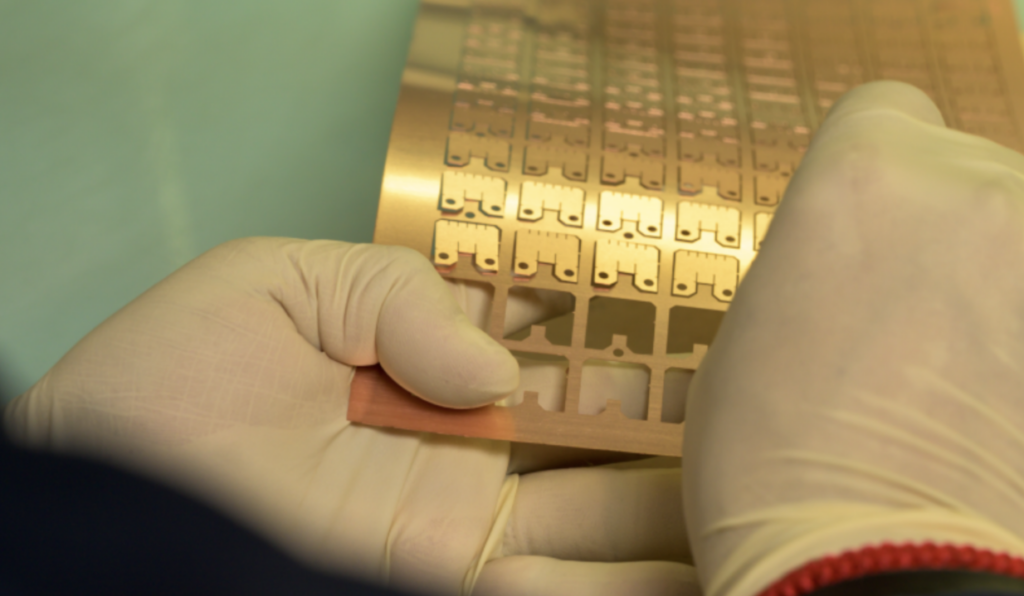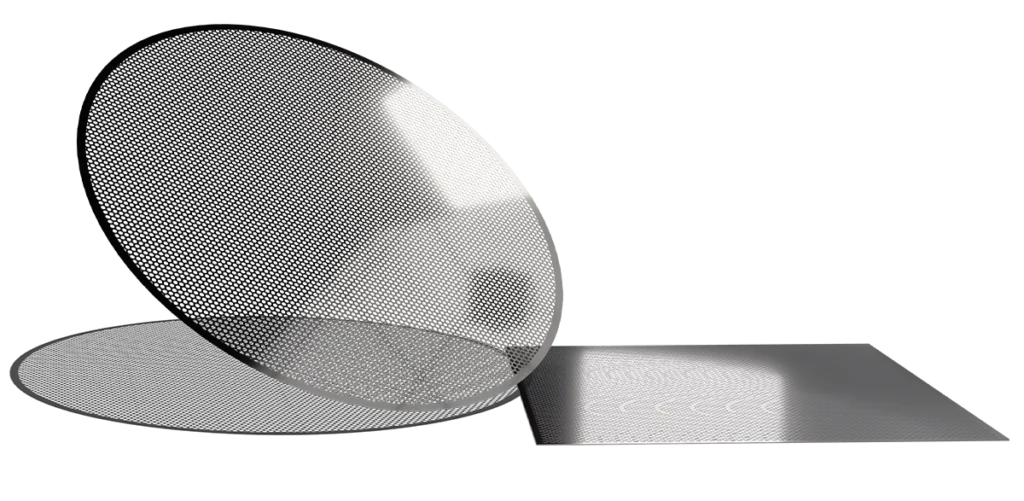As medical technology continues to advance, the components behind these innovations must meet increasingly stringent requirements. For implantable medical devices, engineers, buyers, and MedTech designers are seeking advanced manufacturing methods that deliver unmatched precision, biocompatibility, and repeatability, qualities that are both critical and essential for patient safety and device performance.
Photochemical machining (PCM) has emerged as a superior solution for producing custom, lightweight, high-precision implant components. This advanced process uses a combination of photographic imaging and chemical etching to manufacture metal parts with highly complex geometries and micron-level tolerances, all the while without introducing mechanical stresses, burrs, sharp edges, or heat-affected zones.
The PCM process begins with a photoresist-coated metal sheet, which is selectively exposed to UV light through a high-resolution mask or as the industry refers to as a photo tool. Exposing the photoresist-coated substrate to UV light through the mask defines the designed pattern, and during the developing process, the unexposed areas are protected while the exposed metal areas are revealed for etching. The result is a stress-free, burr-free, and highly accurate part, ideal for thin, intricate, or fragile implantable structures. Photochemical machining, otherwise referred to as photo etching or metal etching, enables the creation of intricate patterns and high-precision parts with rigorous tolerance requirements that require precise control over feature sizes and metal thickness.
Unlike traditional methods such as CNC machining, stamping, or laser cutting, photochemical etching offers several advantages, including but not limited to, producing precision parts cost-effectively, without creating burrs, sharp edges, or mechanical stresses, and is ideal for small production runs across various medical sectors. Key advantages include cost-effectiveness, rapid prototyping, and the ability to work with biocompatible specialty metals like titanium. It’s particularly suited to the exacting needs of medical implants, where dimensional accuracy and surface quality directly impact performance and regulatory compliance.
PCM is suitable for processing a broad spectrum of metals, including stainless steel and tungsten, in a variety of material thicknesses, and can be used for manufacturing flat metal sheets and components such as electrical contacts.
Leading the way in this technology is our team at E-Fab, where our U.S.-based photochemical machining team is specifically known for producing ultra-precise components in challenging metals for high-stakes industries like aerospace, electronics, and medical devices. With ISO-certified quality systems, short lead times, and collaborative engineering support, E-Fab is the trusted partner for MedTech companies bringing the next generation of implantable devices to life.
In the world of implantable medical components, precision isn’t just important, it’s absolutely everything. Photochemical machining ensures that every detail is engineered for performance, safety, and scalability. And with E-Fab, that precision starts on day one.

Why Medical Implants Require Ultra Precision
Implantable devices represent one of the most challenging frontiers in medical design, where engineering innovation intersects directly with human biology. These devices must operate reliably within the complex, variable environment of the human body, often for extended periods of time and under continuous physiological stress. As a result, they are subject to an array of rigorous requirements, ranging from biocompatibility and structural integrity to miniaturization and precise functionality. Achieving precision parts with intricate patterns and minimum feature sizes requires precise control over the manufacturing processes to ensure optimal performance and safety. Central to meeting these demands is extreme precision, even the slightest deviation in dimensions, material performance, or surface finish can compromise safety, effectiveness, or regulatory compliance. The margin for error is virtually nonexistent.
Tight Tolerances for Functional Fit
Implants such as stents, meshes, and battery shields must seamlessly integrate with the human body, or with other device components. This demands micron-level tolerances to ensure a precise fit without compromise. A fraction of a millimeter can be the difference between success and failure.
Patient Safety and Regulatory Compliance
Medical implants must comply with strict regulatory standards, including FDA and ISO certifications. Dimensional accuracy directly affects the performance, safety, and reliability of these devices, leaving no room for manufacturing defects or inconsistencies.
Material Compatibility and Lightweight Design
Materials used in medical implants must be biocompatible, corrosion-resistant, and often lightweight, even more so for load-bearing or mobile applications. Titanium and other specialty metals are common choices, but they require careful handling during fabrication to maintain their properties.
Repeatability in Mass Production
Whether for clinical trials or full-scale manufacturing, repeatability is non-negotiable. Every part must meet the same high standard, batch after batch, with zero compromise.

How Photochemical Machining Meets These Demands
Photochemical machining offers a set of unique and powerful advantages that make it exceptionally better for the stringent and multifaceted requirements of medical device manufacturing. As implantable medical devices continue to evolve in complexity, precision, and regulatory scrutiny, PCM stands out for its ability to deliver high-accuracy components while maintaining the structural and material integrity demanded by the medical field. Here’s how it meets the core challenges:
Stress-Free Process: No Burrs, No Heat-Affected Zone
PCM uses a subtractive chemical etching process that doesn’t involve heat or mechanical force. This means there are no burrs, no microcracks, and no heat-affected zones (HAZ), a critical factor in preserving the mechanical integrity and biocompatibility of metals like titanium.
Ideal for Thin, Intricate, or Fragile Parts
With PCM, it’s possible to manufacture ultra-thin parts (as thin as 0.0005″) with extremely fine features, complex geometries, and tight tolerances. The process excels where mechanical cutting or stamping would distort or damage the part.
Perfect for Titanium and Specialty Metals
E-Fab specializes in machining difficult-to-work metals such as titanium and other implant-grade alloys. PCM handles these materials with precision while preserving their critical material properties.
Scalable: From Prototype to Volume Production
The same tooling used in early-stage prototypes can be scaled up for volume manufacturing, making PCM both cost-effective and time-efficient for the entire product lifecycle.

Process Control and Monitoring: Ensuring Consistent Precision
In the world of medical implant manufacturing, the photochemical etching process stands out for its ability to deliver precise metal components with complex geometries and tight tolerances. Achieving this level of precision requires more than just advanced equipment, it demands E-Fab’s rigorous process control and continuous monitoring systems at every stage.
By implementing robust control systems, our team ensures that each component produced meets the exacting standards required for our client’s medical applications, from the initial application of the photoresist to the final etching of the metal sheet.
Advanced Monitoring for Every Step
To guarantee the highest quality and consistency, the photochemical etching process relies on an advanced team of experts, meticulously monitoring technologies that oversee each critical phase. This real-time oversight allows our engineers to make immediate adjustments if any deviations are detected, ensuring that the desired pattern is transferred flawlessly onto the metal and design requirements are met. By closely monitoring the process, we can prevent defects before they occur, resulting in components with exceptional precision and reliability.
Maintaining Tolerances in High-Volume Runs
Consistency is key when producing large quantities of medical implant components. The photochemical etching process is engineered to maintain tight tolerances even during high-volume production runs. This is achieved by carefully controlling variables such as etching time, temperature, and the concentration and age of chemical etchants. By standardizing our parameters, E-Fab can reliably produce precise metal components that meet stringent specifications, batch after batch. This level of process control is especially critical in industries like medical devices, where even the smallest variation can impact performance and safety.
Traceability and Documentation for Compliance
In highly regulated industries, traceability and thorough documentation are non-negotiable. E-Fab’s photochemical machining process is designed with compliance in mind. Every step of our process is meticulously documented, from the selection of materials and process parameters to inspection results and final quality checks. This comprehensive record-keeping not only ensures that each sheet metal component meets tight tolerances and quality standards, but also provides the traceability required for certifications such as ISO 9001:2015 and AS9100.
By maintaining detailed documentation, we demonstrate compliance with industry regulations and offer customers confidence in the integrity and reliability of their products.

Real-World PCM Applications in Implants
E-Fab’s photochemical machining (PCM) process is already playing a critical role in advancing the next generation of implantable medical devices. By delivering high-precision components with complex geometries, consistent quality, and material integrity, E-Fab enables medical innovators to push the boundaries of design and performance. Below are just a few examples of how PCM is being applied in real-world implant scenarios:
Titanium Surgical Mesh
Used in reconstructive procedures, surgical meshes require exacting geometry and minimal weight. PCM enables the creation of custom, burr-free features that help optimize tissue and bone regrowth.
Stents
These components demand ultra-fine features, and smooth, burr-free edges.. PCM delivers all of these with high repeatability and without compromising material integrity, such as in stainless steel or nitinol.
Advantages Over Other Processes
While CNC machining, stamping, and laser cutting all have their place, photochemical machining offers distinct advantages for implant component manufacturing:
Method: CNC
Heat-Affected Zone: Possible
Burrs: No
Precision for Thin Parts: High
Ideal for Complex 2D Geometries: Good, depending on material type and thickness
Ideal Volume: Low
Method: Stamping
Heat-Affected Zone: No
Burrs: Yes
Precision for Thin Parts: Limited
Ideal for Complex 2D Geometries: Limited geometry complexity
Ideal Volume: High
Method: Laser Cutting
Heat-Affected Zone: Yes
Burrs: Minimal, but may
Precision for Thin Parts: Good
Ideal for Complex 2D Geometries: Can Distort Thin Metals
Ideal Volume: Low
Method: PCM
Heat-Affected Zone: No
Burrs: No
Precision for Thin Parts: High
Ideal for Complex 2D Geometries: Exceptional
Ideal Volume: Low, medium, high
When edge smoothness, flatness, and geometric complexity are top priorities in component manufacturing, especially for critical medical applications, photochemical machining is often the superior choice. Unlike traditional methods, PCM is a non-contact, non-thermal process that eliminates mechanical stress, tool wear, and heat-affected zones. This results in exceptionally smooth, burr-free edges that require no secondary finishing, a key advantage for components that will come into contact with delicate tissue or must maintain precise surface integrity for bonding, sealing, or fluid flow.
Flatness is also better preserved in PCM because there’s no physical force applied during cutting, which helps maintain dimensional stability even in ultra-thin materials. Additionally, PCM excels at creating intricate, high-resolution patterns that would be prohibitively expensive or impossible to achieve with conventional methods. For implantable devices that require micro-scale features, clean finishes, and consistently accurate profiles, PCM delivers a level of precision and reliability that makes it not just an alternative—but often the method of choice.
Why Work with E-Fab?
E-Fab brings unmatched expertise and service to every stage of implantable component development:
We Have Decades of Experience
With decades of success in critical industries like aerospace and MedTech, E-Fab understands the performance demands of high-reliability components.
Engineering Support from Concept to Production
E-Fab’s engineers collaborate directly with your design and development team, optimizing for manufacturability (DFM) without compromising innovation.
ISO-Certified Quality Systems
Operating under ISO 9001 and standards, E-Fab ensures that every product meets the highest quality and traceability requirements for medical applications.
Let E-Fab Get to Work on Your Project
Photochemical machining isn’t just a manufacturing process, it’s a niche precision-driven solution purpose-built for the demands of modern medical innovation. For implantable components that require biocompatibility, ultra-fine features, and repeatable accuracy, E-Fab’s PCM delivers what other methods simply can’t.
With E-Fab as your partner, you gain not only world-class precision and speed, but more importantly the engineering partnership, insight, and dedication your project deserves, to bring your most advanced implant designs to life.
Let’s Get you Connected with Our Team

